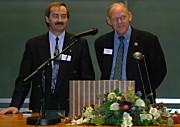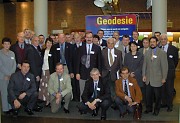 |
Paddy Prendergast, President of the Council of European
Geodetic Surveyors (CLGE) and Professor Stig Enemark, Chair of the FIG Task
Force on Mutual Recognition at the first joint CLGE/FIG Seminar in Delft,
November 2000.
Picture: Esben Munk Sørensen. |
A joint FIG/CLGE seminar on Enhancing Professional Competence was held 3
November at Delft University of Technology in the Netherlands. The aim of the
seminar was to develop a suitable framework for the surveying profession in
Europe as a basis for enhancing professional competence through the principle of
mutual recognition of professional qualifications which has been established in
law at the European level. This is the first joint activity to combine the
efforts of FIG and CLGE (The Council of European Geodetic Surveyors). The
seminar was by invitation only and attracted some 50 participants from 17
countries representing the educational sector and the professional surveying
community in the European region.
The general EU Directive on the mutual recognition of professional
qualifications established the concept of a BAC + 3 (BSc) level of higher
education as a basic criteria for the exchange of professionals between EU
member states. This concept of mutual recognition and the legal framework
imposed by the EU's Directive has resulted in some difficulties of
implementation at national level. The EU Directive is currently under review but
the host organisations recognise the broad principles on which mutual
recognition should be based. These three principles are:
- Transparency - of the procedures within the process of mutual recognition;
- Justification - of the need for restrictions; and
- Proportionality - to ensure equivalent standards.
The seminar aimed to develop a concept based on these three principles and
suitable for the surveying profession in Europe. The seminar was focused on
three issues:
- Threshold standards for professional competence - how to compare and
assess professional competence in different areas of surveying?
- The idea of a core syllabus - is this a possible and suitable approach for
the surveying profession in Europe?
- Models for curricula content - how to compare and assess curricula content
between different countries?
The seminar is part of an on-going process of investigation and debate within
both the CLGE and FIG. In 1998, FIG established a task force on the mutual
recognition of professional qualifications and the CLGE established a working
party on a core syllabus. FIG and CLGE decided to collaborate on the project in
2000, and CLGE awarded two research grants to provide:
- the evidence and arguments to stimulate improvement of curricula, in order
to assist the convergence of standards across Europe; and
- information to assist the determination of equivalence of qualifications
to facilitate the mobility of surveying professionals between European
countries.
Specifically, the intention of this seminar was to widen the debate among the
academic surveying community in Europe and to elicit their opinions and ideas.
The seminar was jointly organised by the CLGE President, Paddy Prendergast
and the Chair of the FIG Task Force on Mutual Recognition, Prof. Stig Enemark.
The sessions were chaired by Prof. Kirsi Virrantaus, the current chair of FIG
Commission 2.
In the introduction Paddy Prendergast discussed some of the main influences
on surveying education, which include the changing commercial environment and
the intensive application of technology in surveying. He stated that the
surveying education in Europe is still focused on national markets, and that
changes are needed to prepare for new international markets at regional and
global levels. CLGE has been involved in research into the varied nature of
surveying within Europe, as demonstrated by the Allan Report (http://www.ge.ucl.ac.uk/clge/allan_report/).
Stig Enemark described the seminar as paving the way for professional competence
in Europe, which is a goal shared by both the CLGE and FIG. He discussed the
changes in the profession within Europe and in employment patterns and
emphasised that "the only constant is change". In such a dynamic professional
environment, the educational base must be flexible and interdisciplinary, and
the graduates must be adaptable to cope with these future changes. University
graduation should therefore be seen as only the first step in a lifelong
educational carrier.
Dr. Frances Plimmer from the University of Glamorgan gave a presentation,
which outlined the methodology applied by the EU Directive to the process of
achieving the mutual recognition of professional qualifications. She explained
that the directive does not directly affect employment or the process of
licensing surveyors; it only gives surveyors from another EU country the right
to have their professional qualifications treated as equivalent to those
acquired by the nationals from any other EU country. The process of becoming
"qualified" varies throughout Europe. In some countries, it is merely by holding
an academic qualification that a surveyor is "qualified", although to undertake
certain surveying tasks, it is also necessary to become licensed, a process
often controlled by the state. In other countries, there are sub-state private
organisations, which regulate both education and professional qualifications.
The delegates at the seminar agreed to contribute further detailed information
in this area. One of the outcomes of the ongoing research will be to identify
and publicise the different national models for becoming a "qualified" surveyor
in Europe. This should improve the understanding of the processes and thereby
enable appropriate organisations to administer the terms of the mutual
recognition directive effectively within the field of surveying.
Rob Ledger from the Royal Institution of Chartered Surveyors described the
CLGE project to identify a core syllabus. The aim was to raise the baseline
quality of surveying education and also improve the mobility of surveyors in
practice. He outlined the problems of listing common subjects in all EU
universities to create a core syllabus. These problems relate to market
diversity and cultures. Course content is based on market requirements and
academic institutions are concerned to equip students to meet market needs.
Also, the definition of a "surveyor" does not always reflect the nature and
activities of "surveying" in a given market; and professional work varies in
different countries according to the way professions have developed over time in
different European countries. In terms of educational policies there is an
input/output debate, with the "input" basis concentrating on topics and hours
studied; whereas the "output" focused on the competencies of the graduates who
leave universities. Professional course assessment models ranged from
self-assessment to accreditation. The inter-relationship between education,
industry, profession and government is very different throughout Europe. All
this diversity has an implication for a core syllabus. The profession, instead,
needs to understand and provide information on different competency and
educational models that have been successful in meeting evolving market needs.
Professor Hans Mattsson from the Royal Institute of Technology, Stockholm
presented his ongoing research on surveying curricula in Europe. His analysis is
based on the Allan Report providing information on the educational programmes
and the professional duties of land surveyors in the European countries. Despite
some identified drawbacks in the methodology of this report the information was
used to identify different models for curricula content compared to professional
practice. The analysis also included comparison of the university course
structures in Sweden, Spain, Germany, Denmark and Ireland on the basis of
subject content and hours studied. Some European countries have a "broad"
surveying profession (e.g. the Nordic countries), while others have a more
"narrow" profession. He identified the dichotomy of a narrow education and a
broad profession and discussed how professional education could be changed and
who should guide such changes. Professor Mattsson considered that the
differences in university curricula models provide a valuable source of
information for universities to learn from each other and to expand and develop
the professional education they offer. He concluded that it would be valuable
within Europe to develop academic teaching networks for surveying schools in
parallel with professional networks.
It seems evident from the debate at the seminar that "the only constant is
change" and that we must continue to ensure that our graduates are educated for
a changing profession in a changing market. It is important to provide future
surveyors with the necessary professional education and training and the
administrative procedures to work anywhere in Europe. While our marketplace is,
currently, Europe, there is a clear indication from the World Trade
Organisation, that the marketplace will soon be global.
There was a clear indication of a future educational profile composed by the
areas of Measurement Science and Land Administration and supported by and
embedding in a broad interdisciplinary paradigm of Geographic Information
Management. There was also a clear indication that a better understanding of
different educational and competence models can establish a general improvement
of the educational base and enhancement of professional competence in the broad
surveying discipline throughout Europe and also at a more global scale.
The proceedings from the seminar including the final research papers,
discussions and recommendations will be available from the FIG office around
April 2000. The background papers are available on the home page of the Task
force on Mutual Recognition (http://www.ddl.org/figtree/tf/mut-recog/index.htm).
 |
Participants to the first CLGE-FIG Seminar on Enhancing
Professional Competence in Delft. |

























